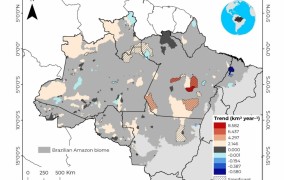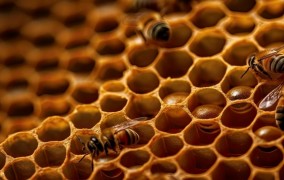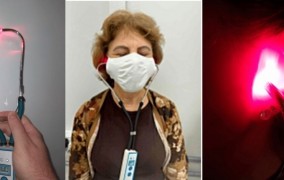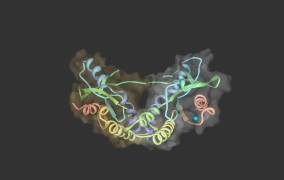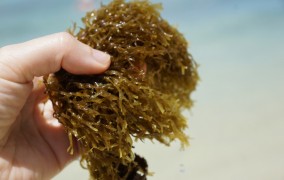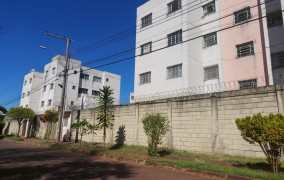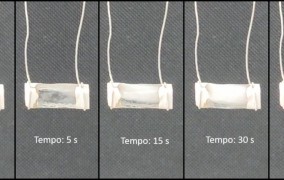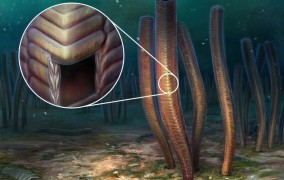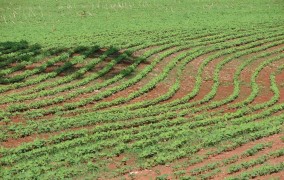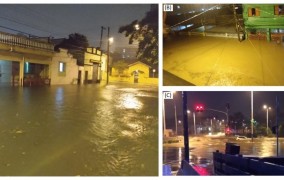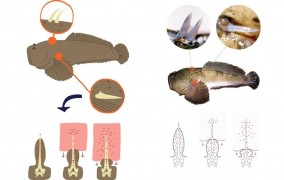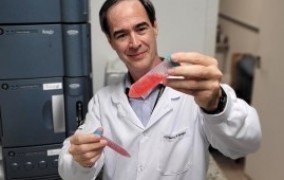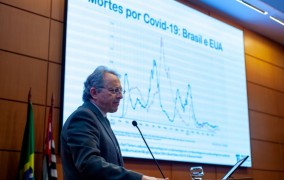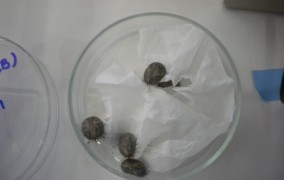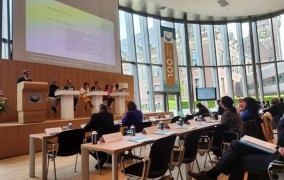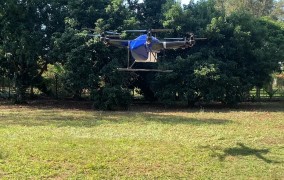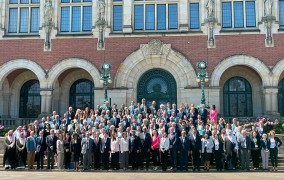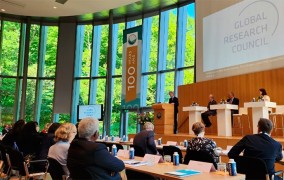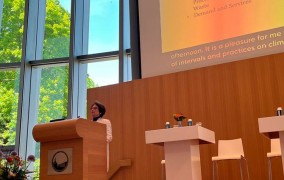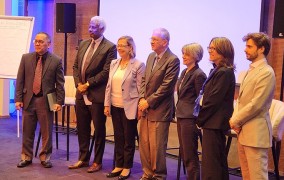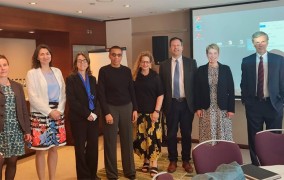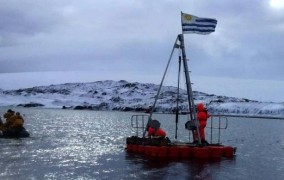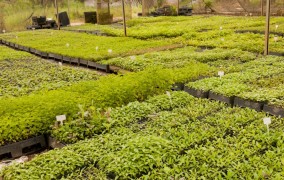
News
-
Entrepreneurial training program helps startups become profitable businesses
2023-07-05A novel methodology used in the 24th edition of the PIPE High-Tech Entrepreneurial Training Program will guide 21 innovative startups in the process of developing customers and refining their business models, among other competencies. -
Deforestation in Indigenous Territories caused emission of 90 million metric tons of CO2 in 2013-21
2023-06-28Scientists analyzed data for the period from 232 Indigenous Territories in Brazil. Results published in Scientific Reports show deforestation rates accelerating between 2019 and 2021. -
Propolis improves immunity, reduces free radicals and attenuates chronic inflammation in HIV patients
2023-06-28A study of 40 asymptomatic subjects living with HIV conducted at São Paulo State University showed that a daily dose of 500 mg was safe and helped combat premature aging. -
COVID-19 sequelae are the highlights of a neuroscience conference at the State University of Campinas
2023-06-28Brazilian researchers analyzed data from MRI scans and various tests to detect biological alterations linked to the neurological symptoms most reported by patients, especially anxiety, depression, sleepiness and fatigue. The latest results were presented to the ninth edition of BRAINN Congress. -
FAPESP joins forces with France’s CNRS to bolster new International Panel on Ocean Sustainability
2023-06-28Soon to be officially launched, IPOS is a coalition of 16 research institutions, research funders and universities. Its mission will be to bridge the science-policy divide and help protect the world’s ocean environment. -
Laser therapy is most effective treatment for tinnitus, study finds
2023-06-28Brazilian researchers compared the therapies used most frequently for tinnitus, which affects some 750 million worldwide. -
Mechanical ventilator maker supported by FAPESP wins approval to start producing in the United States
2023-06-28The FDA has authorized Magnamed to operate a plant in Florida that will produce Oxymag, its portable emergency ventilator. -
Storm clusters are decreasing in the Amazon, study suggests
2023-06-21Scientists at the University of São Paulo have shown that the occurrence of mesoscale convective systems, which account for 40% of precipitation in the Amazon, is already being affected by climate change. -
Brazilian fossil provides earliest evidence of evolutionary trait that enabled dinosaurs to become giants
2023-06-21Bone cavities called air sacs appeared in the ancestors of long-necked dinosaurs about 225 million years ago, according to the analysis of a specimen found in Rio Grande do Sul state, South Brazil. The study also shows that air sacs did not evolve as linearly as scientists believe. -
Study identifies intracellular protein that can block inflammation in autoimmune diseases
2023-06-21The discovery, led by researchers at a FAPESP-supported center, could lead to novel treatments for autoimmune diseases. -
Green technology permits total use of seaweed by cosmetics industry
2023-06-21A review article goes beyond international standards to propose zero waste methodologies in the production of natural assets from marine organisms. -
Study proposes simple low-cost solutions to improve thermal comfort in social housing
2023-06-21As well as benefiting users, the aim was to contribute to energy saving and help reduce greenhouse gas emissions. -
Innovative technique obtains glass-ceramic materials faster and saves energy
2023-06-21The technique was developed at the Federal University of São Carlos (UFSCar) in São Paulo state, Brazil, and could impact the manufacturing of batteries, smartphone screens and other devices. -
A 540 million-year-old fossil of an articulated animal can change how we understand evolution
2023-06-14Carapace resembling scaled armor used by medieval knights appears to be first evidence of defense against predators and linked to origin of large group of animals with bilateral symmetry, which includes humans. Advanced techniques including electron microscopy and tomography applied to rocks found in Brazil in the 1970s enabled scientists to reconstruct this animal’s morphology. -
Conversion of 5% of pastureland to cropland could double biofuel production, study shows
2023-06-14The data, referring to Brazil, Argentina, Colombia and Guatemala, was presented by the FAPESP Bioenergy Research Program (BIOEN) during a seminar hosted by the International Energy Agency. -
Experiment in Brazil identifies flood-prone areas of cities
2023-06-14The study combined models that predict urban expansion and land-use changes with hydrodynamic models, and the results were validated using actual data for São Caetano do Sul, a city in metropolitan São Paulo. -
Peptide from venomous fish toxin controls lung inflammation in mice
2023-06-14A research group at Butantan Institute performed tests on animal models with asthma as a reference and demonstrated that the peptide from Thalassophryne nattereri, common in North and Northeast Brazil, is safe and efficacious. -
Researchers and university officials discuss metrics for social impact of science
2023-06-14The meeting at FAPESP was attended by Youngsuk ‘YS’ Chi, Chairman of Elsevier. -
Novel technology produces natural colorants with enhanced stability from grape residue
2023-06-14Resin applied to purification of compound can be reused in eight different cycles without loss of effectiveness. -
Brazilian algorithm aims to project future of Amazon Rainforest and predict changes in carbon capture
2023-06-07The computer program was developed at the State University of Campinas to include more vegetation diversity in the analysis of climate change impacts. -
The choices we make in the near future will define the impact of climate change for generations to come
2023-06-07The alert came from scientists who participated in the 10th German-Brazilian Dialogue on Science, Research and Innovation, organized by the German Center for Science and Innovation in São Paulo in partnership with FAPESP. -
‘New pandemics could emerge soon. We must be prepared,’ says head of Butantan Institute
2023-06-07Esper Kallás, who heads Latin America’s leading producer of vaccines, delivered the Second 2023 FAPESP Lecture on “Viruses, pandemics and vaccines”. He spoke about the “100 Day Mission” to produce novel vaccines in just over three months. -
Study identifies a protein that could be a target for a vaccine against spotted fever
2023-06-07The molecule was identified by researchers at the University of São Paulo in cells of the Amblyomma tick that transmits the disease. -
New working group of the GRC is tasked with facilitating multilateral cooperation in science
2023-06-07First meeting was held last week in The Hague, Netherlands, during the Annual Meeting of the Global Research Council. -
An innovative crop sprayer drone with an automated refueling system
2023-06-07Brazilian technology developed with FAPESP’s support can be used to spray large or small areas, economizing inputs, lowering costs and mitigating environmental impacts. -
Projects on adolescent obesity and drinking selected by international consortium
2023-06-07The call was issued in 2022 by the Global Alliance for Chronic Diseases, a transnational consortium of research funders set up to combat chronic non-communicable diseases in low- and middle-income countries. Two proposals supported by FAPESP were among those approved. -
International cooperation is key for tackling global problems and this underscores GRC’s strategic role
2023-06-02Representatives from 81 research funding agencies from 63 countries are meeting this week in The Hague, in the Netherlands, for the Annual Meeting of the Global Research Council, co-organized by FAPESP. In discussion, topics that will help shape the future of research around the world. -
Funding agencies from 63 countries ratify document for broader and more inclusive research
2023-06-02A charter of principles was ratified during the annual meeting of the Global Research Council. The goal is to establish common practices to assess the quality of the science produced and facilitate international collaborations. -
International scientific collaboration helps reduce regional disparities in tackling climate change
2023-06-02Assessment was made by experts at the third day of the Annual Meeting of the Global Research Council. During the event, practices on funding research on the topic were ratified by representatives of funding agencies from 63 countries. -
The quest for equity and inclusion in the research ecosystem has moved beyond the gender issue
2023-06-02This assessment was made by participants of an event promoted on Tuesday by the Gender Working Group of the Global Research Council. One of the panelists was Marco Antonio Zago, president of FAPESP. -
Funders discuss how to foster scientific collaboration amid growing geopolitical tensions
2023-06-02Debate was hosted by Swedish, American and Japanese research funding agencies at the Annual Meeting of the Global Research Council. -
Scientific publishers and funding agencies unite in favor of racial and ethnic diversity in research
2023-06-02Initiatives developed by Elsevier, Royal Society of Chemistry, South Africa’s National Research Foundation and German Research Foundation were presented at event held in The Hague, Netherlands. -
Research project analyzes medical, nutritional and environmental applications of new Antarctic bacteria
2023-05-31Discovered by Uruguayan scientists in 2013, two psychrophilic (cold-adapted) species have been experimented with since 2018 by a partnership between IIBCE in Montevideo and the University of São Paulo in Brazil. -
Municipal administrators know about NbS but rarely use them to reduce environmental inequality
2023-05-31Study mapped knowledge of nature-based solutions among municipal staff responsible for projects in 20 Brazilian cities. The survey points to the need to adapt the approach used in the northern hemisphere to local conditions. -
Rather than being a risk factor, asthma could protect patients from progressing to severe COVID-19
2023-05-31Researchers in São Paulo state analyzed data for over 1 million patients hospitalized for treatment by the public health service after contracting COVID-19. Lower levels of inflammatory cytokines and fewer ACE2 receptors for the virus to bind to may be the explanation. -
Study associates sleep apnea in babies with increased risk of hypertension in adulthood
2023-05-31In experiments involving rats, researchers at São Paulo State University found that periods of low oxygen levels in the first months of life can lead to dysregulation of the sympathetic autonomic nervous system, which controls functions such as heart rate and blood pressure. The discovery points to possible routes to the development of novel therapies. -
Biodressing accelerates skin wound healing in diabetic mice
2023-05-31A biodressing containing human umbilical cord stem cells was produced in a 3D printer by the startup In Situ Cell Therapy. Researchers at the University of São Paulo found that when used on diabetic mice, the “smart” biodressing modulated the immune response, stimulated collagen synthesis and enhanced tissue repair. -
Researchers develop a sweet potato with nearly twice as much beta-carotene as the main commercial variety
2023-05-31Research groups in São Paulo state and Mozambique analyzed carotenoids in over 1,000 sweet potatoes and found some with 88% more beta-carotene, a precursor of vitamin A. -
Study points out errors in illustrations of one of the most famous scientific experiments
2023-05-24Described by Benjamin Franklin in the mid-eighteenth century, the kite experiment was an important step toward our modern understanding of electricity, but the pictures that popularized this episode are full of inaccuracies. -
Leishmania parasite manipulates organism’s defense system to continue replicating, study shows
2023-05-24Leishmania alters the structure of the human protein that would normally induce the death of infected cells and weakens the inflammatory response. Reported in Nature Communications, the discovery could serve as a basis for better treatment. -
At the United Nations, FAPESP takes part in a forum on the Sustainable Development Goals
2023-05-24FAPESP has funded more than 40,000 research projects linked to one or more SDGs, said Marco Antonio Zago. -
Study proposes criteria to help delimit and conserve Cerrado wetlands
2023-05-24No fewer than eight important hydrographic basins depend on the ecosystems that make up the Cerrado, Brazil’s savanna-like biome, but ambiguities in the legislation have permitted the advance of soybean plantations in the region. The warning is in an article by Brazilian researchers in the journal Perspectives in Ecology and Conservation. -
In resistance training, focusing on load or number of repetitions leads to same muscle growth
2023-05-24A study by researchers at the State University of Campinas showed that although the two types of training produce similar metabolic stress, muscle activation is different. -
Toxins are detected in samples of curd cheese and artisan mozzarella in Brazil
2023-05-24An analysis conducted at the University of São Paulo showed that no sample exceeded the recommended limit for aflatoxin M1, a contaminant of fungal origin considered carcinogenic. Nevertheless, the researchers warn of the need to demand best practices in dairy production. -
Study proves efficacy of remote physical training in rehabilitation of severe COVID patients
2023-05-17A program developed by researchers at the University of São Paulo included three weekly sessions of up to 80 minutes each for 16 weeks, with positive effects on cardiorespiratory fitness, lung function, functional capacity, body composition and persistent symptoms. -
Researchers find compound that combats multidrug-resistant bacteria in less than one hour
2023-05-17In vitro experiments were conducted at a FAPESP-supported research center with a synthetic peptide inspired by molecules secreted by the probiotic bacterium Lactobacillus plantarum. -
Leader of federal agency lists suggestions for revitalization of Brazilian science
2023-05-17Ricardo Galvão, President of the National Council for Scientific and Technological Development (CNPq), discussed the status quo and outlook for Brazilian science in the first of the 2023 FAPESP Lectures. -
Temperature of solar flares helps understand nature of solar plasma
2023-05-17A new study simulated dozens of solar flares and showed that analysis of the Lyman Continuum spectrum formed by hydrogen ionization and recombination can be used for diagnosis of the solar plasma. -
Study reveals novel action mechanism of corticosteroids in combating inflammation caused by COVID-19
2023-05-17Brazilian researchers observed an increase in production of endocannabinoid, a natural anti-inflammatory neurotransmitter, in COVID-19 patients given glucocorticoids. The discovery points to possibilities of novel treatments for various inflammatory and neurological diseases. -
Brazilian researchers test technique that can make analysis of male fertility potential more accurate
2023-05-17Scientists at São Paulo State University repurposed a device already used to analyze bovine reproductive cells to observe different characteristics of human sperm simultaneously.
Most popular
-
Parents’ alcohol and drug use influences their children’s consumption, research shows
2026-02-13
-
Impact-formed glass evidence of cosmic collision in Brazil about 6 million years ago
2026-02-18
-
Second spider-parasitic mite described in Brazil
2026-01-05
-
Babies exposed to poverty show delays in motor development as early as six months
2026-03-02
-
Study reveals protein linked to spread of pancreatic cancer through nerves
2026-01-14
-
Study warns of nutritional risks of prolonged use of the drug omeprazole
2026-02-04
-
The ‘yo-yo effect’ impairs metabolism and reduces brown fat activity in women
2026-02-02
-
Research shows how immune system reacts to pig kidney transplants in living patients
2026-01-08
-
Artificial saliva containing sugarcane protein helps protect the teeth of patients with head and neck cancer
2026-01-07
-
Brazilian research reveals how some types of breast cancer ‘evade’ treatment
2026-01-21






